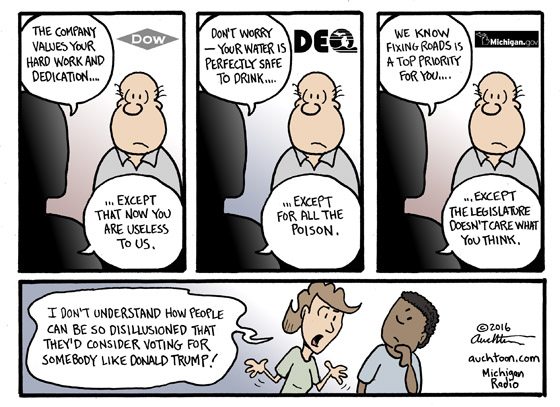
There are few universally shared experiences these days. The ability to indulge our varied interests makes points of intersection increasingly rare. One of the few exceptions is layoffs. Whether you have direct experience with the swinging axe or just near misses, we are all familiar with the type of “right-sizing” recently announced at Dow in mid-Michigan.
Layoffs are never pleasant. Some are reasonable (sales are down, costs are up, something has to give). Some are anything but reasonable (the CEO pooped his pants and the company needs to create a distraction, stockholders want to build indoor pools at their beach houses, somebody said we might save tens of dollars if we move the whole works to Uzbekistan). I’m not ready to judge the Dow layoffs. (Oh, I will most definitely judge; I’m just not ready.)
What I am ready to do is propose a challenge: I would like somebody to quantify the psychological cost of things like layoffs at Dow, Flint’s water crisis, and our lousy infrastructure. We hear all the time from economists about the positive effects of companies streamlining. What about the negative effects?
My unit of measurement would be a gut-punch. A gut-punch by itself is not inherently bad. It might wake you up — make you take stock and plan ahead. But continuous gut-punches wear people down and make us desperate: You’re laid-off your good-paying job. Ooof. You retrain, get a new job, and someone else is laid off, leaving you with five times the responsibility but at the same pay. Ooof. You work hard, develop new efficiencies, but then you’re laid-off. Ooof.
So what’s the collective number of gut-punches that tip the scales toward desperation? If we knew that, maybe we could avoid the recklessness of having Donald Trump as a viable candidate for President. Ooof.




There might be a problem with the data tonight. I had to take a circuitous route to get here. So, do not be down hearted if you do not get many replies.
In my house, we still are way down from what we used to earn, back before the Bush/Cheney World Recession. I hear young well-compensated commentators saying that the economy is back, but that is not true. All my sympathy to the Dow lay-off victims.
Trump has strong support from uneducated white males which shouldn’t make sense but it does. The attack on the middle class and unions is a divide and conquer strategy so they play their twist to turn lower paid people against anyone that earns more than them. That includes educated people that feel they are underpaid, no matter that they didn’t really learn anything or ever really work,… those of us earning more than them must be overpaid so take us down, misery loves company.
It’s going to get worse if Trump is elected president. btw~I thought the cartoon was referring to Michigan Governor Snyder before I read the last frame.
I misphrased that, I meant I wasn’t expecting it to compare Snyder to Trump.
I take issue with your comment that educated people don’t work. I am a retired teacher with a Master’s Degree, and I often worked sixteen hours a day, but was only paid for six. I worked with 150+ students per day. (Not an exaggeration.) I worked from before sun up until after sundown. I worked with no raises, no overtime, and no thank you. I worked at physical chores that were not part of my job description, such as scrubbing floors, moving heavy office furniture, and washing windows. I worked at emotionally taxing situations such as counseling parents of drug addicted students, soothing maltreated coworkers, and breaking up fights. Most of all, however, I worked at researching, preparing, delivering, and correcting the results of lessons that would actually TEACH my students substantive activities and information. It is a difficult job to create something meaningful from nothing. Try it sometimes.